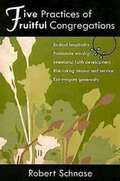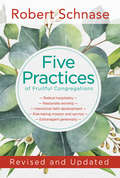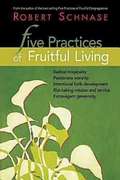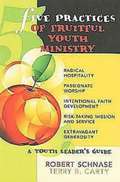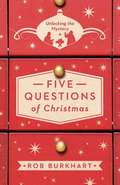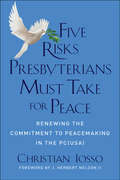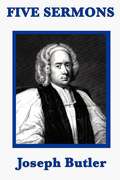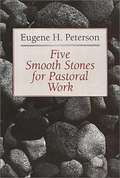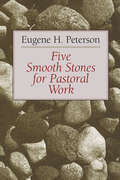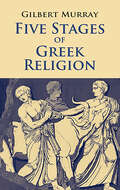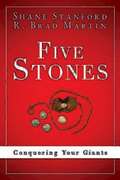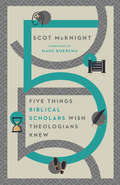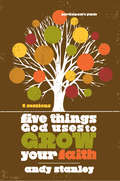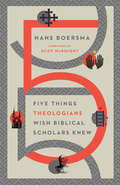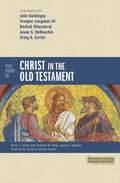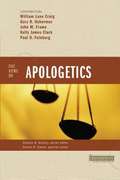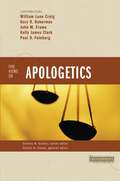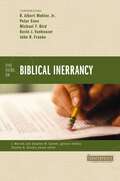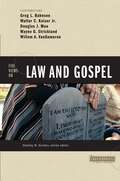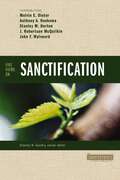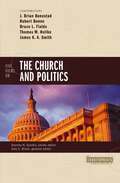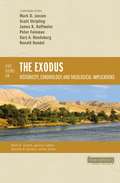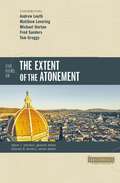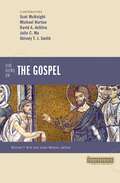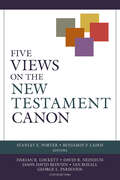- Table View
- List View
Five Practices of Fruitful Congregations
by Robert SchnasePeople are searching for a church shaped and sustained by Radical Hospitality, Passionate Worship, Intentional Faith Development, Risk-Taking Mission and Service, and Extravagant Generosity. These fundamental practices are critical to the success of congregations. Their presence and strength demonstrate congregational health, vitality, and fruitfulness. By repeating and improving these practices, churches fulfill their mission to make disciples of Jesus Christ for the transformation of the world. Robert Schnase astutely weaves theological insight, practical advice, and exemplary stories into an inspiring book for pastors and laity alike. --L. Gregory Jones, Dean and Professor of Theology, Duke Divinity School Robert Schnase's words are thoughtful, provocative, and challenging. Any congregation will find encouragement and insight to deepen faithfulness and multiply fruitfulness. --Lovett H. Weems, Jr., Distinguished Professor of Church Leadership, Wesley Theological Seminary Stimulating. Challenging. Uniquely helpful. Bishop Schnase gives us powerful language, rich examples, and practical suggestions for fulfilling the mission God gives us. --Janice Riggle Huie, Bishop of the Texas Conference of The United Methodist Church
Five Practices of Fruitful Congregations: Revised and Updated (Five Practices Of Fruitful Congregations Ser.)
by Robert SchnaseOver the past ten years, thousands of church leaders have successfully transformed congregations with the principles from the original Five Practices: Radical Hospitality, Passionate Worship, Intentional Faith Development, Risk-Taking Mission and Service, and Extravagant Generosity. However, much has changed in the world and the Church. Leaders have discovered new ways to implement the Five Practices in settings that were not imagined when the original book was released. This revised and updated edition of the ministry leadership classic includes a significant amount of new material. How are the Practices being used now, in new types of congregations? How has each Practice changed in the last decade? What new issues or concerns do leaders need to consider in relation to each Practice? This revision provides leaders with a 'next step' look at the original practices. Schnase gathered ideas and other content from ministry leaders who have been using the Five Practices, and explains how those ideas work, how leaders adapted the principles to their own settings, and how they expanded them. A new preface redefines 'Congregations' given their evolving nature. When the original book was written, the new forms of Christian community either did not exist or were barely known. The Five Practices are, however, just as essential to the new types of congregations as they were to the traditional church. Since the original book, there is more variety, diversity, and experimentation in worship. The revised Five Practices includes material based on these new forms. Small group study has always been important for intentional faith development. But since the original book, the nature of those groups has transformed to include secular settings and a wide variety of affinities profoundly affecting how faith leaders approach issues of faith development, and in many cases radically changes what they offer in their communities. Imagine the topic of Risk-Taking Mission and Service before Black Lives Matter, the Syrian refugee crisis, and the Trump administration. This new version gives instruction and specific ideas for how we might best serve today’s world.
Five Practices of Fruitful Living
by Robert SchnaseHow do I cultivate a life that is purposeful, deep, and fruitful? What are the commitments, critical risks, and personal practices that open me to God's grace? How can I discover the spiritual life and the difference God intends for me to make in the world? Radical Hospitality. Passionate Worship. Intentional Faith Development. Risk-Taking Mission and Service. Extravagant Generosity. Five Practices of Fruitful Living provides an honest, practical, and winsome guide to the spiritual journey. By repeating and deepening certain fundamental practices, we cooperate with God in our spiritual growth. These five practices - to receive God's love, to love God in return, to grow in Christ, to serve others, and to give ourselves fully - as we attend to them and develop them, help us settle ourselves in God and become instruments of God's grace. Following Christ will change your heart; and through you, God will change the world. FROM THE INTRODUCTION - "Five Practices of Fruitful Living moves the discussion of Christian practice from the congregational level to the personal practices of discipleship. The fruitful, God-related life develops with intentional and repeated attention to five essential practices that are critical for our growth in Christ. Radical Hospitality. Passionate Worship. Intentional Faith Development. Risk-Taking Mission and Service. Extravagant Generosity. These practices open our heart—to God, to others, to a life that matters, a life rich with meaning, relationship, and contribution. They help us flourish."
Five Practices of Fruitful Youth Ministry: A Youth Leader's Guide
by Robert SchnaseLead youth to live radically, passionately, intentionally, extravagantly—taking risks to become fruitful disciples of Jesus.These ten ready-to-use sessions teach the fundamentals of Christian living. Radical Hospitality, Passionate Worship, Intentional Faith Development, Risk-Taking Mission, and Extravagant Generosity--these five practices, designed to shape both heart and mind, will help youth grow in their discipleship as they transform the world. Features: 2 ready-to-use interactive sessions for each practiceReproducible pagesScripture referencesSuggestions for discussionQuestions for reflectionPlanning helpsTried-and-true activities from youth groups across the countryRobert Schnase is Bishop of the Missouri Annual Conference of The United Methodist Church and bestselling author of Five Practices of Fruitful Congregations.Terry B. Carty is Director of The Youthworker Movement.
Five Questions of Christmas: Unlocking the Mystery
by Rob BurkhartThe Christmas story is well-known. We know the decorations, the family parties, the carols, the manger scene, even the familiar Scripture passages. But have you ever considered the questions of Christmas? Five questions spiral throughout the ancient stories surrounding Christ’s birth. These questions open the door to some of life’s great mysteries. By exploring questions asked by the Magi, Elizabeth, Mary, Zechariah, and the crowd witnessing the naming of John the Baptist, readers explore their own curiosities about purpose, favor, trust, justice, doubt, and promise: How can we find truth and meaning? Why is the world so unfair sometimes? Why do people have to suffer? How can we trust the unseen? How can we design the future we desire? Writing in a warm and affectionate tone, author Rob Burkhart unwraps the mystery of the questions of Christmas, revealing a different way to read the Christmas story that allows believers young and old to live its truths throughout the year.
Five Risks Presbyterians Must Take for Peace: Renewing The Commitment To Peacemaking In The Pc(usa)
by Christian IossoBelieving peacemaking to be an inherent part of discipleship, Presbyterians have taken many valiant stands for peace throughout our history. However, changing global realities, political and military actions, and new weapons of war have made the world less safe than ever. The church must reconsider how to be faithful peacemakers in this changing reality. <P><P>The Presbyterian Church recently spent six years reflecting on peacemaking. Building on past policy documents, people at all levels of the church studied and discussed what peacemaking policies needed to be modified given the world context today. The 2016 PC(USA) General Assembly affirmed five affirmations the church must make to fulfill its peacemaking calling. Those affirmations become risks when truly taken, because their message collides with the demands for continued sacrifice by the powers that be. In this timely resource, author Christian Iosso explains what the five risks are, how they differ from previous positions, and what taking each risk might look like today. <P><P>Ideal for individual or group study, this important resource includes questions for reflection and discussion.
Five Sermons
by Joseph ButlerJoseph Butler was an English bishop, theologian, apologist, and philosopher. He was born in Wantage in the English county of Berkshire. He is known, among other things, for his critique of Thomas Hobbes's egoism and John Locke's theory of personal identity. During his life and after his death, Butler influenced many philosophers, including David Hume, Thomas Reid, and Adam Smith
Five Smooth Stones For Pastoral Work
by Eugene H. PetersonOriginally published in 1980 and now being reprinted to meet continuing demand, 'Five Smooth Stones for Pastoral Work' shows how five Old Testament books provide a solid foundation for much of what a pastor does.
Five Smooth Stones for Pastoral Work
by Eugene H. PetersonWhereas much of the current literature on pastoring stresses up-to-date training and new techniques stemming from the behavioral sciences, Eugene Peterson here calls for returning to an "old" resource--the Bible--as the basis for all of pastoral ministry. Originally published in 1980 and now being reprinted to meet continuing demand, Five Smooth Stones for Pastoral Work shows how five Old Testament books provide a solid foundation for much of what a pastor does: Prayer-Directing: Song of SongsStory-Making: RuthPain-Sharing: LamentationsNay-Saying: EcclesiastesCommunity-Building: Esther Pointing to the relevance of ancient wisdom, adapting Jewish religious tradition to contemporary pastoral practice, and affirming a significant link between pastoral work and the act of worship, this book opens up to pastors a wealth of valuable practical-theological insights.
Five Stages of Greek Religion: The History Of The Olympian Gods Of Ancient Greece (hardcover)
by Gilbert MurrayBeginning with Greece's earliest rites, this volume traces the development of the classic religion of the Olympian gods and discusses the religion of the philosophic schools of the fourth century BC. It portrays the emergence of Christianity and concludes with an account of the efforts of Julian the Apostate to restore a new variety of paganism.
Five Stones
by Shane Stanford R. Brad MartinOur most important battles are not always with the 'giants out there'--those external challenges which we all face. The greatest battles are often within ourselves. Too often, we diminish our own potential in ministry, business, and in life. Shane Stanford and Brad Martin frame their powerful book on one of the most well-known and well-loved stories in history: David and Goliath. We all feel like the seemingly powerless, scrawny boy David sometimes. And we all must face "giants"--those challenges that threaten to overwhelm us in ministry, work-life, and in our personal lives. Five Stones is a series of clear and compelling lessons. Each lesson arms the reader with practical and powerful tools of self-discovery, so that the reader's own liabilities, opportunities, convictions, and capabilities are revealed. Like modern-day Davids, readers will leave this book empowered to conquer challenges, in ministry and in life, with clear-eyed confidence and well-grounded hope.
Five Things Biblical Scholars Wish Theologians Knew
by Scot McKnightThe disciplines of biblical studies and theology should serve each other, and they should serve both the church and the academy together. But the relationship between them is often marked by misunderstandings, methodological differences, and cross-discipline tension. New Testament scholar Scot McKnight here highlights five things he wishes theologians knew about biblical studies. In a companion volume, theologian Hans Boersma reflects on five things he wishes biblical scholars knew about theology. With an irenic spirit as well as honesty about differences that remain, McKnight and Boersma seek to foster understanding between their disciplines through these books so they might once again collaborate with one another.
Five Things God Uses to Grow Your Faith Bible Study Participant's Guide
by Andy StanleyImagine what life would be like if you had PERFECT faith.In this video-based Bible study (DVD sold separately), pastor and best-selling author Andy Stanley builds a biblical case for five things God uses to grow BIG faith.Imagine how different your outlook on life would be if you had absolute confidence that God was with you. Imagine how differently you would respond to difficulties, temptations, and even good things if you believed with certainty that God was in all of it and was planning to leverage every circumstance for good.This Participant Guide is filled with helpful discussion starters, video overviews, a Leader's Guide and much more. It's designed to be used with the companion Five Things God Uses to Grow Your Faith DVD (sold separately). When used together they provide a powerful catalyst for spiritual growth.Sessions include:1. Big Faith2. Practical Teaching3. Providential Relationships4. Private Disciplines5. Personal Ministry6. Pivotal Circumstances
Five Things Theologians Wish Biblical Scholars Knew
by Hans BoersmaThe disciplines of theology and biblical studies should serve each other, and they should serve both the church and the academy together. But the relationship between them is often marked by misunderstandings, methodological differences, and cross-discipline tension. Theologian Hans Boersma here highlights five things he wishes biblical scholars knew about theology. In a companion volume, biblical scholar Scot McKnight reflects on five things he wishes theologians knew about biblical studies. With an irenic spirit as well as honesty about differences that remain, Boersma and McKnight seek to foster understanding between their disciplines through these books so they might once again collaborate with one another.
Five Views of Christ in the Old Testament: Genre, Authorial Intent, and the Nature of Scripture (Counterpoints: Bible and Theology)
by ZondervanThe authors of the New Testament regularly quote and allude to Old Testament passages that point to the presence, person, and work of Jesus. Jesus himself claimed that Moses wrote about him (John 5:46). And on the road to Emmaus, Jesus instructed the disciples from "Moses and all the prophets" regarding himself (Luke 24:27).Though Christians affirm that the Old Testament bears witness to Christ, how the Old Testament writers did this is a matter of extensive debate. Furthermore, Christian biblical scholars also debate the degree to which contemporary interpreters of the Bible can follow the hermeneutics of the New Testament authors in using the Old Testament to point to the person and work of Jesus Christ.Five Views on Christ in the Old Testament is the first book to bring together in conversation the major views on how the Old Testament points to Christ. Contributors and views include:The First Testament Priority View (John Goldingay)The Christotelic View (Tremper Longman III)The Redemptive-Historical Christocentric View (Jason DeRouchie)The Reception-Centered Intertextual View (Havilah Dharamraj)The Premodern View (Craig Carter)Each contributor presents their preferred methodology, showing readers how their interpretive approach best explains the biblical data. Additionally, authors provide case studies of various Old Testament passages that equip readers to better compare the strengths and weaknesses of each of author's approaches. This essential resource will help readers learn practical steps to help them read the Old Testament more faithfully as it testifies to Jesus the Messiah.
Five Views on Apologetics
by Kelly James Clark William Lane Craig Paul D. Feinberg John M. Frame Gary R. HabermasThe goal of apologetics is to persuasively answer honest objections that keep people from faith in Jesus Christ. But of several apologetic approaches, which is most effective? Five Views on Apologetics examines the "how-to" of apologetics, putting five prominent views under the microscope: Classical, Evidential, Presuppositional, Reformed Epistemology, and Cumulative Case. Offering a forum for presentation, critique, and defense, this book allows the contributors for the different viewpoints to interact. Like no other book, Five Views on Apologetics lets you compare and contrast different ways of "doing" apologetics. Your own informed conclusions can then guide you as you meet the questions of a needy world with the claims of the gospel. The Counterpoints series provides a forum for comparison and critique of different views on issues important to Christians. Counterpoints books address two categories: Church Life and Exploring Theology.
Five Views on Apologetics (Counterpoints: Bible and Theology)
by Stanley N. Gundry Steven B. CowanThe goal of apologetics is to persuasively answer honest objections that keep people from faith in Jesus Christ. But of several apologetic approaches, which is most effective? Five Views on Apologetics examines the “how-to” of apologetics, putting five prominent views under the microscope: Classical, Evidential, Presuppositional, Reformed Epistemology, and Cumulative Case. Offering a forum for presentation, critique, and defense, this book allows the contributors for the different viewpoints to interact. Like no other book, Five Views on Apologetics lets you compare and contrast different ways of “doing” apologetics. Your own informed conclusions can then guide you as you meet the questions of a needy world with the claims of the gospel. The Counterpoints series provides a forum for comparison and critique of different views on issues important to Christians. Counterpoints books address two categories: Church Life and Bible and Theology. Complete your library with other books in the Counterpoints series.
Five Views on Biblical Inerrancy (Counterpoints: Bible and Theology)
by Stanley N. Gundry R. Albert Mohler Jr. Kevin J. Vanhoozer John R. Franke Michael F. Bird James R.A. Merrick Peter E. Enns Stephen M. GarrettThere is little doubt that the inerrancy of the Bible is a current and often contentious topic among evangelicals. Five Views on Biblical Inerrancy represents a timely contribution by showcasing the spectrum of evangelical positions on inerrancy, facilitating understanding of these perspectives, particularly where and why they diverge. Each essay in Five Views on Biblical Inerrancy considers: the present context and the viability and relevance for the contemporary evangelical Christian witness; whether and to what extent Scripture teaches its own inerrancy; the position’s assumed/implied understandings of the nature of Scripture, God, and truth; and three difficult biblical texts, one that concerns intra-canonical contradictions, one that raises questions of theological plurality, and one that concerns historicity. Five Views on Biblical Inerrancy serves not only as a single-volume resource for surveying the current debate, but also as a catalyst both for understanding and advancing the conversation further. Contributors include Al Mohler, Kevin Vanhoozer, Michael Bird, Peter Enns, and John Franke.
Five Views on Law and Gospel (Counterpoints: Bible and Theology)
by Stanley N. Gundry Douglas J. Moo Greg L. Bahnsen Walter C. Kaiser Jr. Wayne G. Strickland Willem A. VangemerenDo the Law and the Gospel belong to two separate dispensations? Has the Gospel replaced the Law? What is the relevance of the Old Testament Law to our lives as Christians? Is there continuity between it and what Christ expects of us in the Gospel? It is no secret that Christians have differed widely on these questions. This book explores five major approaches to this important biblical topic that have developed in Protestant circles. Each of the five authors presents his particular perspective on the issue and responds to the other four. The Counterpoints series provides a forum for comparison and critique of different views on issues important to Christians. Counterpoints books address two categories: Church Life and Bible and Theology. Complete your library with other books in the Counterpoints series.
Five Views on Sanctification (Counterpoints: Bible and Theology)
by John F. Walvoord Anthony A. Hoekema Stanley M. Horton Melvin E. Dieter J. Robertson Mcquilkin Stanley N. GundaryChristians generally recognize the need to live a holy, or sanctified, life. But they differ on what sanctification is and how it is achieved. Five Views on Sanctification brings together in one easy-to-understand volume five major Protestant views on sanctification. Writing from a solid evangelical stance, each author describes and defends his own understanding of the doctrine, and responds as well to the views of the other authors. This book addresses such practical questions as: How does one achieve sanctification in this life? How much success in sanctification is possible? Is a crisis experience following one's conversion normal--or necessary? If so, what kind of experience, and how is it verified? The Counterpoints series provides a forum for comparison and critique of different views on issues important to Christians. Counterpoints books address two categories: Church Life and Bible and Theology. Complete your library with other books in the Counterpoints series.
Five Views on the Church and Politics (Counterpoints: Bible and Theology)
by Stanley N. Gundry Amy E. Black Bruce Fields J. Brian Benestad James K.A. Smith Robert Benne Thomas W. HeilkeFew topics can grab headlines and stir passions quite like politics, especially when the church is involved. Considering the attention that many Christian parachurch groups, churches, and individual believers give to politics—and of the varying and sometimes divergent political ideals and aims among them—Five Views on the Church and Politics provides a helpful breakdown of the possible Christian approaches. Readers will find themselves equipped to think more deeply about the relationship between church and state in a way that goes beyond mere policy debates and current campaigns. General Editor Amy Black brings together five top-notch political theologians in the book, each representing one of the five key political traditions within Christianity: Anabaptist (Separationist)—Thomas Heilke Lutheran (Two Kingdom)—Robert Benne Catholic (In Tension)—J. Brian Benestad Reformed (Integrationist)—James K. A. Smith Black Church (Prophetic)—Bruce Fields Each author addresses his tradition’s theological distinctives, the role of government, the place of individual Christian participation in government and politics, and how churches should (or should not) address political questions. Responses by each contributor to opposing views will highlight key areas of difference and disagreement. Thorough and even-handed, Five Views on the Church and Politics will enable readers to consider the strengths and weaknesses of the most significant Christian views on political engagement and to draw their own, informed conclusions.
Five Views on the Exodus: Historicity, Chronology, and Theological Implications (Counterpoints: Bible and Theology)
by ZondervanGain a thorough understanding of the competing views on the historicity, chronology, and theological implications of the exodus. The biblical account of the Israelite exodus from Egypt is one of the most enduring narratives ever told and is a foundational event for several world religions. It resonates across cultures with its timeless themes of redemption and deliverance. It is also the only explanation the Bible gives for Israel's origin.Despite its unique legacy, many scholars regard the exodus as fictitious or a cultural memory that may not be a historical event. Even among those who believe the exodus happened, there is no consensus regarding its date.Five Views on the Exodus brings together experts in the fields of biblical studies, Egyptology, and archaeology to discuss and debate the most vexing questions about the exodus. Each offers their own view and constructive responses to other leading views:Early Date: The Exodus Took Place in the Fifteenth Century BC (Scott Stripling)Late Date: A Historical Exodus in the Thirteenth Century BC (James K. Hoffmeier)A Hyksos Levite Led Exodus in the Time of Ramesses II (Peter Feinman)Alternative Late Date: The Exodus Took Place in the Twelfth Century BC (Gary A. Rendsburg)The Exodus as Cultural Memory: A Transformation of Historical Events (Ronald Hendel)The Counterpoints series presents a comparison and critique of scholarly views on topics important to Christians that are both fair-minded and respectful of the biblical text. Each volume is a one-stop reference that allows readers to evaluate the different positions on a specific issue and form their own, educated opinion.
Five Views on the Extent of the Atonement (Counterpoints: Bible and Theology)
by ZondervanFor whom did Christ die? Who may be saved? are questions of perennial interest and importance for the Christian faith. In a familiar Counterpoints format, this book explores the question of the extent of Christ's atonement, going beyond simple Reformed vs. non-Reformed understandings. This volume elevates the conversation to a broader plane, including contributors who represent the breadth of Christian tradition. <p><p> This book serves not only as a single-volume resource for engaging the views on the extent of the atonement but also as a catalyst for understanding and advancing a balanced approach to this core Christian doctrine. The Counterpoints series provides a forum for comparison and critique of different views on issues important to Christians. Counterpoints books address two categories: Church Life and Bible and Theology. Complete your library with other books in the Counterpoints series.
Five Views on the Gospel (Counterpoints: Bible and Theology)
by Michael Horton Scot McKnight David A. deSilva Julie C Ma Shively T.J SmithFive Views on the Gospel presents five different perspectives on the question "What is the gospel?" Presenting a variety of contemporary and tradition-based perspectives, each contributor answers key questions about the nature of the gospel. Questions contributors address include:What is the gospel?What is the context for understanding the New Testament teaching about the gospel?What are the primary biblical texts that you believe express the gospel and how do you understand them?What are people called to do with the gospel and what are the benefits promised by the gospel?How can the definition and proclamation of the gospel be contextualized and made relevant today?What example of an inadequate gospel and a false gospel can you offer?What does it mean to live a life worthy of the gospel? The CounterPoints format provides a unique opportunity for each contributor to set forth their own understanding of the gospel, to interact with competing perspectives, and for the editors to sum up points of agreement and disagreement and a path forward in the debate.Positions and Contributors include:The Reformation Gospel (Michael Horton)The King Jesus Gospel (Scot McKnight)The Wesleyan Gospel (David A. deSilva)The Pentecostal Gospel (Julie C. Ma)A Liberation Theology Gospel (Shively T. J. Smith) The Counterpoints series presents a comparison and critique of scholarly views on topics important to Christians that are both fair-minded and respectful of the biblical text. Each volume is a one-stop reference that allows readers to evaluate the different positions on a specific issue and form their own, educated opinion.
Five Views on the New Testament Canon (Viewpoints)
by Stanley E. PorterWhat historical, political, and ecclesial realities drove the canonization of the New Testament? How are the doctrines of Early Christianity related to the formation of the New Testament? Should the New Testament differ in authority from other early Christian texts? As these questions demonstrate, the enduring influence of the New Testament does not lessen the dispute over the events and factors leading to its adoption. Five Views on the New Testament Canon presents five distinct ways of understanding how the New Testament came to be: • A Conservative Evangelical Perspective – Darian R. Lockett • A Progressive Evangelical Perspective – David R. Nienhuis • A Liberal Protestant Perspective – Jason David BeDuhn • A Roman Catholic Perspective – Ian Boxall • An Orthodox Perspective - George L. Parsenios Each contributor addresses historical, theological, and hermeneutical questions related to the New Testament canon, such as what factors precipitated the establishment and recognition of the New Testament canon; the basis of any authority the New Testament has; and what the canon means for reading and interpreting the New Testament. Contributors also include a chapter each responding to the other views presented in the volume. The result is a lively exchange suitable for both undergraduate and graduate students seeking to grasp the best canon scholarship in biblical studies.
